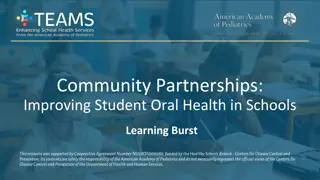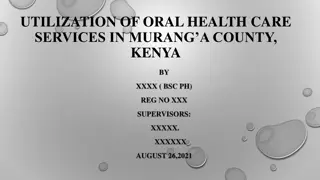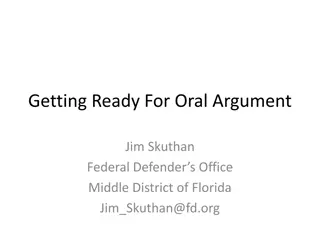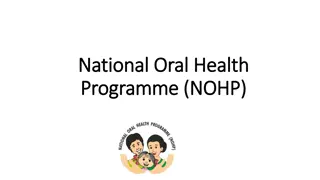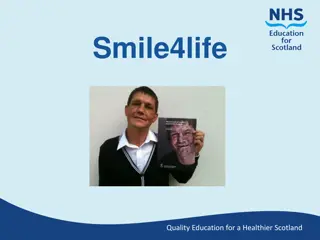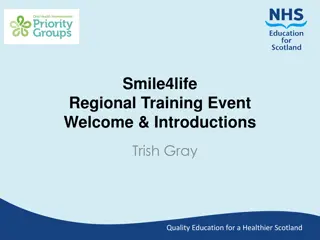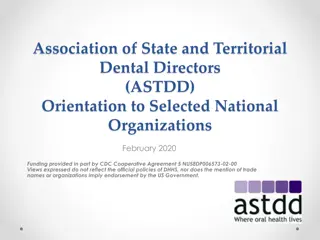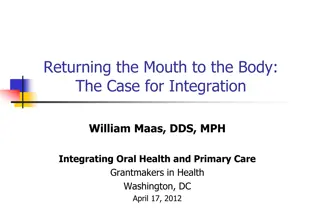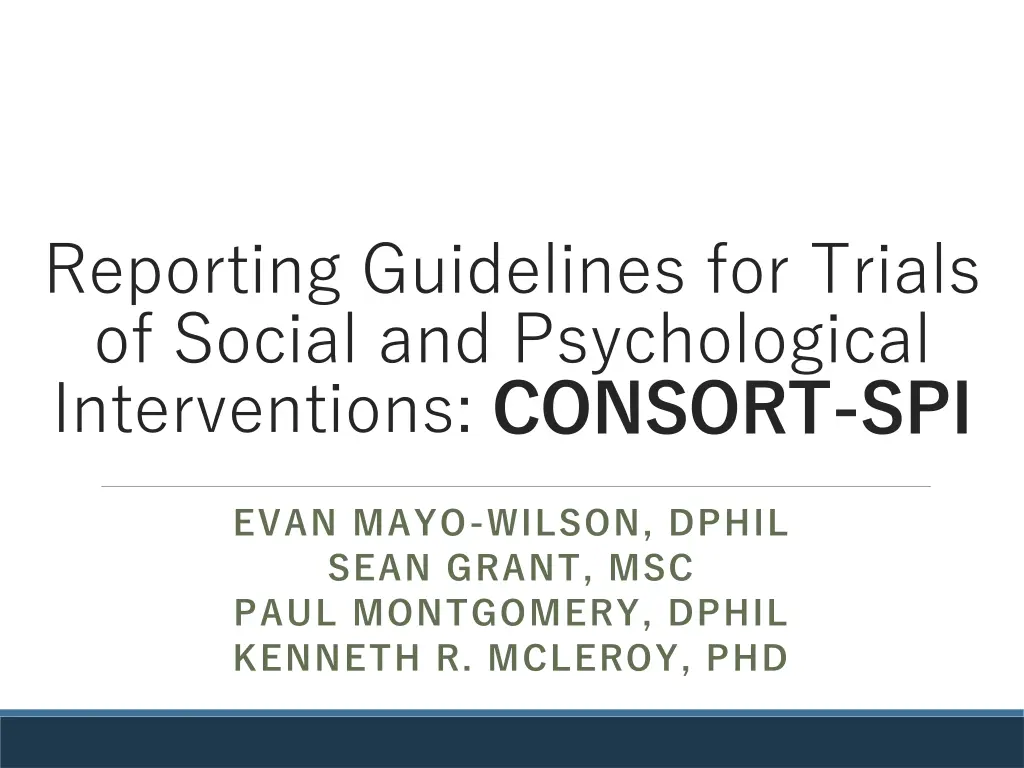
Reporting Guidelines for Social and Psychological Interventions
Understand the importance of reporting standards in trials of social and psychological interventions. Explore the history of reporting standards, the CONSORT-SPI extension, and why it is necessary for complex interventions in disciplines like criminology, social work, education, psychology, and public health.
Download Presentation

Please find below an Image/Link to download the presentation.
The content on the website is provided AS IS for your information and personal use only. It may not be sold, licensed, or shared on other websites without obtaining consent from the author. If you encounter any issues during the download, it is possible that the publisher has removed the file from their server.
You are allowed to download the files provided on this website for personal or commercial use, subject to the condition that they are used lawfully. All files are the property of their respective owners.
The content on the website is provided AS IS for your information and personal use only. It may not be sold, licensed, or shared on other websites without obtaining consent from the author.
E N D
Presentation Transcript
Reporting Guidelines for Trials of Social and Psychological Interventions: CONSORT-SPI EVAN MAYO-WILSON, DPHIL SEAN GRANT, MSC PAUL MONTGOMERY, DPHIL KENNETH R. MCLEROY, PHD
Presenter disclosure Kenneth R. McLeroy, PhD (1)The following personal financial relationships with commercial interests relevant to this presentation existed during the past 12 months: No relationships to disclose 2
Why reporting standards? Systematic reviews of RCTs are an important standard for effectiveness research Typically rely on (published) reports of research Numerous reviews suggest overall reporting quality is bad (Grant et al. 2013, Stevens et al. 2014) Issues with: Randomization Post hoc hypothesis testing Positive result bias Failure to publish bias and reporting of harms Misinterpretation of findings Transparency in research
History of reporting standards Current widely endorsed reporting standards CONSORT: RCTs TREND: Quasi experiments PRISMA: Systematic literature reviews Effects of reporting standards Completeness (Hopewell et al. 2010) Transparency Replicability EQUATOR Network
CONSORT Methods of development: 1. Meta-epidemiology (literature review) 2. Consensus processes o Delphi panel of experts o Consensus meeting 3. Dissemination o Journal endorsement o Use by authors/reviewers/editors 25-item checklist Flow chart (Moher et al. 2010)
Why the Extension for Social and Psychological Interventions (SPI) Physical, mental and social outcomes Complex interventions with multiple, interacting components Outcomes at multiple levels Contextually dependent Hard-to-control environments May take on multiple forms while targeting same outcomes While technically suitable for RCTs, many of the issues many of the issues addressed apply to other research designs.
Disciplines Covered by the CONSORT-SPI Extension: Criminology Social Work Education Psychology Public Health
Procedures for Developing the SPI Extension Phase I Literature review Phase II Delphi Process (384 from 32 countries) Reviewed and endorsed existing CONSORT items Identified additional items for inclusion Phase III 31 attendees drawn from Delphi group 14 new items identified Highlighted issues to discuss in Explanation and Elaboration document o Social and psychological mechanisms of action, multi-level problems, subjective outcomes, natural settings
NEW CONSORT-SPI Checklist: 1. 2. 3. Title and abstract Background and objectives (modified) Methods (modified): Trial design (unit of assignment) Participants (eligibility criteria for setting) Intervention (level of intervention, delivery as planned, availability of intervention materials, providers assigned to groups) Outcomes Sample size Randomization Awareness of assignment Analytical methods (missing data) Results (modified): Participant flow (approached, screened, eligible, attrition) Recruitment Baseline data/numbers (SES) Outcomes and estimation (availability of trial data) Discussion Important information (modified to include other potential interests) Stakeholder involvement (new item) 4. 5. 6. 7.
Dissemination Process Discipline-specific versions Explanation and Elaboration (E&E) with examples of good writing Journal endorsement Training and education Public feedback: http://tinyurl.com/CONSORT- study
Project Publications Mayo-Wilson et al. (2013). Developing a reporting guideline for social and psychological intervention trials. Trials, 14, 242. Grant et al. (2013). Reporting quality of social and psychological intervention trials: a systematic review of reporting guidelines and trial publications. PLoS One, 8(5), e65442 Montgomery et al. (2013). Protocol for CONSORT- SPI: An Extension for Social and Psychological Interventions. Implementation Science, 8, 99.
Project Executive Paul Montgomery, University of Oxford Evan Mayo-Wilson, Johns Hopkins University Sean Grant, RAND Geraldine Macdonald, Queen s University Belfast Sally Hopewell, University of Oxford Susan Michie, University College London David Moher, Ottawa Health Research Institute
International Advisory Group J Lawrence Aber Steve Pilling Chris Bonell Lawrence Sherman David Clark James Thomas Frances Gardner Elizabeth Waters Steve Hollon David Weisburd Jim McCambridge Jo Yaffe Laurence Moore Mark Petticrew
Consensus Meeting Participants Doug Altman Kamaldeep Bhui Andrew Booth Peter Craig Manuel Eisner Mark Fraser Larry Hedges Robert Kaplan Peter Kaufmann Spyros Konstantopoulos Kenneth McLeroy Brian Mittman Arthur Nezu Edmund Sonuga-Barke Gary VandenBos Robert West

